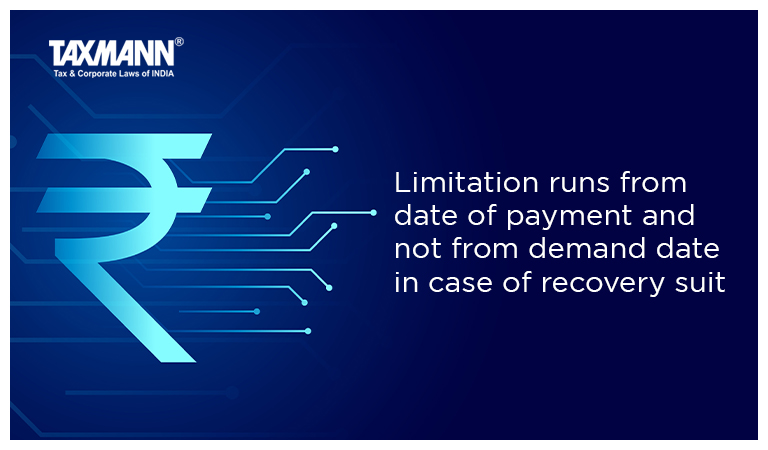Limitation runs from date of payment and not from demand date in case of recovery suit
- Blog|News|Company Law|
- 3 Min Read
- By Taxmann
- |
- Last Updated on 1 August, 2022

Case Details: Topline Shoes Ltd. v. Punjab National Bank - [2022] 140 taxmann.com 636 (SC)
Judiciary and Counsel Details
-
- B.R. Gavai & Pamidighantam Sri Narasimha, JJ.
Facts of the Case
In the instant case, the appellants challenged the order made by the High Court of Bombay whereby the writ petition filed by the appellants arising out of the concurrent orders passed by the learned Debts Recovery Tribunal (DRT) and orders passed by the learned Debts Recovery Appellate Tribunal was dismissed.
An original application (O.A) was filed by the respondent–Bank against the present appellants raising certain claims. The appellants filed a counter-claim claiming that a certain amount deposited in the current account opened by them with the respondent-Bank, was illegally withheld by the respondent–Bank.
The learned DRT dismissed both, the claim of the bank as well as the counter-claim of the appellants. Being aggrieved, both the respondent- Bank as well as the appellants had preferred appeals before the learned DRAT. However, both the appeals were dismissed.
Thereafter, two writ petitions were filed, one by the respondent-Bank and the other by the appellants. The writ petition of the respondent-Bank was disposed of as withdrawn since the respondent- Bank didn’t press for the same. However, the writ petition of the appellants was dismissed vide the impugned judgment. Being aggrieved, an appeal was made to the Supreme Court.
It was submitted that both the DRT and the DRAT as well as the High Court have grossly erred in arriving at the conclusion that the claim of the present appellants was covered under Article 113 and not by Article 22 of the Schedule to the Limitation Act, 1963.
Further, it was submitted that though the amount deposited by the appellants was not a security or a fixed deposit, still it was an amount which belonged to the appellants and was illegally withheld by the respondent-Bank. Therefore, in view of Article 22 of the Limitation Act, the cause of action to file a counter-claim would begin from the date on which notice was sent by the appellants to the respondent-Bank, i.e., from September, 1999. Since the counter-claim was filed in the year 2000, i.e., within a period of three years from the date of issuance of a notice, the same was within the period of limitation.
Supreme Court Held
The Supreme Court observed that Article 22 of the limitation Act,1963 provides limitation for a suit for money deposited under an agreement that it shall be payable on demand, including money of a customer in the hands of his banker so payable. The limitation period of 3 years under Article 22 runs from the date of demand by the depositor. Where an amount paid to the bank by the borrower is not by way of deposit but admittedly under undue influence, Article 113 applies and not Article 22.
The Supreme Court held that under Article 22, the limitation of 3 years runs from the date the cause of action arises (i.e. date of payment under the undue influence) and not from the date of demand of refund. Therefore, a suit to recover money paid under the undue influence was time-barred if was filed after 5 years from the date it was so paid.
In view of the above, it was held that no error could be noticed in the finding of the fact as recorded by the DRT, the DRAT and the High Court that the counter-claim was squarely covered under Article 113 and not under Article 22 of the Limitation Act. Accordingly, the appeal was to be dismissed.
Disclaimer: The content/information published on the website is only for general information of the user and shall not be construed as legal advice. While the Taxmann has exercised reasonable efforts to ensure the veracity of information/content published, Taxmann shall be under no liability in any manner whatsoever for incorrect information, if any.

Taxmann Publications has a dedicated in-house Research & Editorial Team. This team consists of a team of Chartered Accountants, Company Secretaries, and Lawyers. This team works under the guidance and supervision of editor-in-chief Mr Rakesh Bhargava.
The Research and Editorial Team is responsible for developing reliable and accurate content for the readers. The team follows the six-sigma approach to achieve the benchmark of zero error in its publications and research platforms. The team ensures that the following publication guidelines are thoroughly followed while developing the content:
- The statutory material is obtained only from the authorized and reliable sources
- All the latest developments in the judicial and legislative fields are covered
- Prepare the analytical write-ups on current, controversial, and important issues to help the readers to understand the concept and its implications
- Every content published by Taxmann is complete, accurate and lucid
- All evidence-based statements are supported with proper reference to Section, Circular No., Notification No. or citations
- The golden rules of grammar, style and consistency are thoroughly followed
- Font and size that’s easy to read and remain consistent across all imprint and digital publications are applied



 CA | CS | CMA
CA | CS | CMA

Sir. Can a Bank file Arbitration case in 2018 for Rs.6-26 Lakhs on a Credit Card limited to Rs.25000/- utilised before 1998?. Whether Limitation of 3 years is applicable Lindly advise.
Section 43 (1) of the Arbitration And Conciliation Act, 1996 The Limitation Act, 1963 shall apply to arbitrations as it applies to proceedings in court. Therefore, the time period prescribed in Limitation Act shall be applicable
Limitation of 3 years for filling of recovery suit in which section ?
Please refer Article 21 of the Schedule